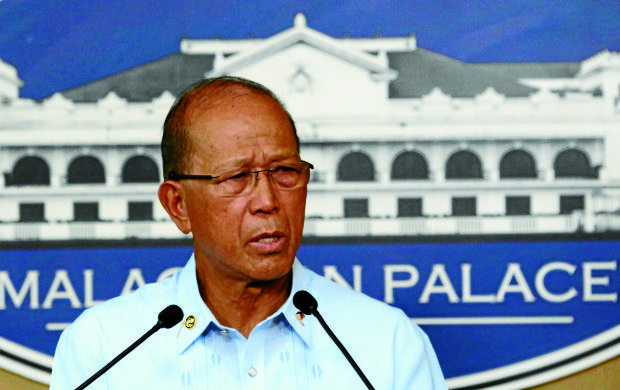Controversial trader to supply weapons to PH
BEIJING—Poly Technologies Inc., a controversial Chinese arms trader, will provide military equipment to the Philippines under a $500-million loan agreement between Beijing and Manila, according to the Philippines’ Defense Secretary Delfin Lorenzana.
Speaking at a press briefing on Sunday night, Lorenzana said the Chinese company provided a letter of intent for an arms supply deal.
Poly Technologies officials met with President Duterte on Sunday, Lorenzana said.
‘Wide array’
Mr. Duterte was in Beijing to attend the two-day Belt and Road Forum for International Cooperation, joining delegates, including some heads of state, from 28 other countries.
Lorenzana said Poly Technologies was offering the Philippines “a wide array of defense equipment” for some of which the Chinese government offered a $500-million loan.
A subsidiary of China Poly Group Corp., Poly Technologies, was sanctioned by the United States in 2013 for violating the Iran, North Korea and Syria Nonproliferation Act.
The law imposes sanctions on private and public entities that provide equipment or technology that could have a “material contribution” to the development of weapons of mass destruction or cruise or ballistic missile systems to rogue states.
The sanctions on Poly Technologies were lifted in 2015.
Lorenzana said the Philippines would send a technical working group to China to look at the equipment being offered by Poly Technologies.
He could not say what weapons the Philippines needed, as these would depend on the recommendation of the Army, Navy and Air Force.
“We are not saying that we will buy from them or we will not buy from them, but if we need anything from the Chinese defense industry then we’re going to procure using the loan that they are going to offer to us,” Lorenzana said.
Territorial defense
The Philippines needs warships and multirole jet fighters to defend its territory in the South China Sea.
China claims almost all of the South China Sea, a claim that the UN-backed Permanent Court of Arbitration in The Hague invalidated last year in a challenge brought by the Philippines after Beijing seized Panatag Shoal, a rich fishing ground off Zambales province, after a two-month maritime standoff in 2012.
China rejected the ruling, insisting on bilateral talks to settle rival territorial claims.
Brunei, Malaysia, Vietnam and Taiwan also have claims in the South China.
But while it offers talks, China is building artificial islands in the South China Sea and topping them with military facilities, including runways and missile batteries.
Unlike Vietnam, which has fought naval battles with China over territory in the South China Sea, the Philippines has nothing to defend its own territory in the globally important waterway.
Separate matters
Lorenzana, however, does not relate the South China Sea dispute with the modernization of the Philippine military.
“I think we should separate our dispute from the South China Sea from our relationship with the Chinese,” he said.
He said China also offered $14 million in December last year, although he did not clarify if this was also a loan.
He said the money would be used to purchase four fast boats, 200 sniper rifles and several hundred grenade launchers with ammunition—all of which would be delivered by the end of the year.
